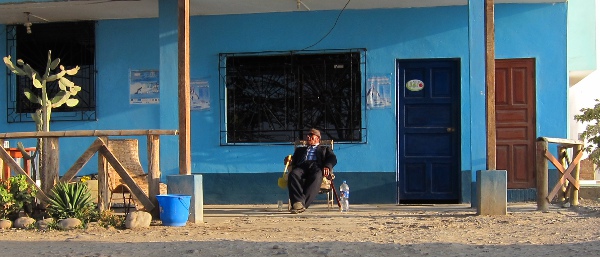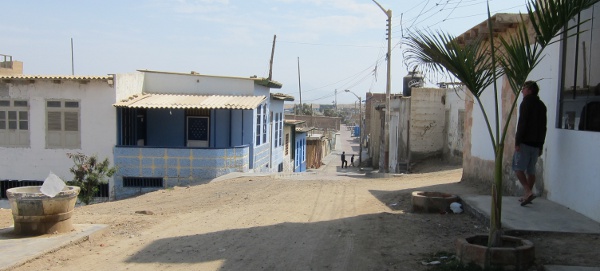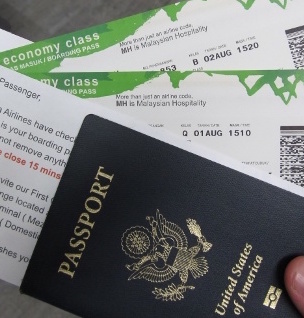The Key to Freedom isn’t Making More, it’s Spending Less
Photo: El Hombre, the most chilled out man in the world. Chicama, Peru.
If you’re trying to cast off the anchors of modern society, the key isn’t making more money, it’s needing less. Doing this requires voluntarily self-destructing the mindset that makes you think you need more in the first place.
After traveling through ‘less-developed’ countries around the world, returning to the US is a shock. It’s hard to imagine why anyone would need a Chevy Tahoe, the newest version of the iPhone, or any of the other nearly unlimited and arguably useless consumer products available to anyone with a credit card.
I used to be a part of this system, but I’ve been progressively weaning myself from it. Turns out there are some amazing benefits to be had from completely checking out.
“Hi, I’m Clayton. I don’t buy things.”
I don’t like talking about it, but for a brief period I made what I would consider a lot of money. Well beyond what I needed for food, clothing, and shelter, even while living in one of the most expensive cities on earth (San Francisco).
And what did I do? Basically, I bought shit I didn’t need.
Partially just because I could. The thought process went something like “Well, I have money, so I should have a nice [insert consumer category here]…”
Partially because I had some unconscious desire to live up to social norms. If everyone in your peer group dresses fashionably, has the newest version of the iPhone, or drives a flashy car, there’s a good chance you will too.
But buying things was also a way to temporarily stave off a growing dissatisfaction with my life and how I was spending my time. It turns out there were some intangibles that just weren’t being satisfied by the work-spend-repeat consumer treadmill.
Then one day I quit, boxed up all my stuff, sold as much of it as I could, and checked out of this system.
And I literally stopped buying things.
I mean, I just stopped spending money. My total monthly expenditures dropped to the monthly price of a shared apartment in San Francisco.
Part of this was necessity, realizing that I wouldn’t have an income for a long time. Part of it was strategy, making a conscious decision to trade non-crucial expenses for additional travel time.
But the biggest part of it was the simple result of leaving the United States and the unlimited options for consumer purchases contained there.
It’s amazing what happens in a place where there is nothing to buy. It limits a lot of useless motion around either acquiring goods or the means to buy them.
And at that point, you actually find some meaning in your life.
Essentially, no matter what we buy, acquire, or win, we adapt to and eventually derive a relatively small amount of satisfaction from. The most insidious part is the accompanying ‘life-style creep’ of elevated expectations. Like a rising tide, our baseline for consumer-based satisfaction and ‘comfort’ moves ever-upward. We go ’round-and-’round on the treadmill of earn-spend-repeat, oblivious to the constant need for greater levels of satisfaction through buying crap we don’t need.
In many ways like a drug addiction.
We can literally spin on this treadmill for our entire lives and never get anywhere. The temporary satisfaction brought on by buying things doesn’t last, and it turns out you probably don’t need any of that stuff to feel good or accomplish your goals anyway.
Spending less helps remove artificial substitutes for real happiness that can get you by, apparently, for a lifetime.
And as a result of placing meaning in experiences, not buying things, the void that was once kept at bay by petty purchases and lifestyle accouterments can be replaced by a deep and more pervasive calm. It’s the satisfaction of not needing anything, which in and of itself constitutes total freedom—freedom from our hyper-capitalistic society as well as freedom from the most basic and consuming parts of the psyche which, ultimately, want you to be unhappy.
The only way to combat this is by blowing the whole system apart, either permanently or on a regular basis.
Ultimately, checking out of consumer culture gives you freedom that is largely unknown in most of American society.
I’m not talking about not buying the basics, like food and shelter. I’m talking about not buying anything that doesn’t immediately facilitate what you really need to survive and have a real life experience. Yes, I occasionally buy surfboards, climbing gear, airline tickets, travel gadgets, and so on, but I’ve whittled it down to the exception rather than the rule.
Let me be perfectly clear here lest I be accused of hypocrisy: it’s not that I don’t buy anything, it’s just that most purchases I make have to surmount an extremely aggressive decision-making gatekeeper that asks of each item: “I don’t buy things. Why should I make an exception for you?”
This year I’ve repeatedly made ‘Things-to-Buy’ lists that, under intense scrutiny, evaporate. It turns out I just don’t need any of it to achieve my goals. And I’m happier and making more forward progress than ever.
The result is a net massive decrease in spending, a clearer realization of what I actually need to spend money on to achieve my goals, and a major cut in the mental bandwidth required to choose between unlimited consumer options.
At first, straight-up not buying things might seem profoundly limiting, especially when so much of our routines and self-identities are maintained by spending money. But take a deep breath, look around, and realize that if you can figure out how to severely limit your spending, you’ve just earned total freedom: a ticket out of the invisible consumer prison that keeps the vast majority of people locked into mass hysteria.
After over 15+ months away from what I would call the ‘real world’ I realized that the calm and contentedness I feel is not just a result of doing the things I want, but it’s also due to a sort of Zen-like state brought on by this (not new, but) revived mantra of simplicity.
And lest you be concerned, the simple life is by no means the boring life. I’d say owning a home in suburbia and plopping down in front of the 40″ plasma TV every night is about the most soul-crushing existence I could imagine—and that takes far more money than anything I want to do.
Besides the pervasive calm, spending less has some other major advantages:
Spending less on crap means more money for the good stuff.
Well, no duh, but the point is that if you ruthlessly screen all purchases you make and stop spending money on things you don’t need you’ll have considerably more at your disposal for things that actually help you achieve your goals. Turn down a few $20-$50 purchases and suddenly you have a few hundred dollars at your disposal.
The key is to err on the side of not buying things.
Essentially, this is the same concept as ruthlessly guarding your attention for the things you actually want to get done. In the same way that you should not do anything that isn’t pushing you toward your goals, you shouldn’t spend anything that doesn’t either.
Hoard your money away from mindless purchases so you can spend it on what matters.
Spending less simplifies decision-making.
The best way to make decisions quickly without the associated loss in attention is to have a decision-making framework that reduces options.
What I seem to be coming back to is that the framework ‘don’t spend anything’ is far more satisfying than the framework ‘you have it, might as well spend it’. Why? Because I no longer have to think about things I might buy. That mental bandwidth now goes to things that are actually important and that I care about.
Reducing options might seem counterintuitive to those who think that more is always better. Turns out, it’s not. Not for traveling, not for living.
What if you could go anywhere and do anything on earth, right now? If that sounds incredible you haven’t really thought about it enough. Without a mental framework to narrow options down you’d deliberate on where to actually go until the cows come home. The same goes for thinking about all the things you could buy.
Knowing you can live on less decreases the fear of doing so.
Set aside a certain number of days, during which you shall be content with the scantiest and cheapest fare, with course and rough dress, saying to yourself the while: “Is this the condition I feared?” –Seneca (Pulled from the 4HWW)
Losing your job sucks, but knowing that you live on almost nothing gives you the confidence that no matter how bad things get you’re going to be fine. Once you’ve been there it isn’t such a big deal anymore.
I could live on board nails. –Thoreau in Walden
For the rest of my life I have this in my back pocket: if everything goes to hell, I know I can hunker down and live on peanuts and shovel gravel (metaphor), and it isn’t really a big deal. This gives me a lot of freedom to experiment with lifestyle design and income generation in a way that wasn’t possible with the fear of ‘losing everything.’
The key is that your purchasing tendencies have to decrease along with your income, something most people have a lot of trouble with. Like anything else, these are learned skills, and there are tools and information to make it possible if you’re willing.
Unrestrained consumption is doomed anyway.
Unfortunately, the US has a culture obsessed with inputs.
In everything from petroleum imports to caloric intake to income, we’ve been trained to think only about how to much more we can get coming in the door, not how we all might benefit from using less.
Conservation is almost a taboo topic in the land of unlimited and exponentially growing choice. God forbid we don’t get our cheap gasoline (so we can drive as much as we want), our fat-free junk foods (so we can eat as much as we want) and our astronomic salaries (so we can spend with impunity).
I hate to say ‘root of all our problems’ but there’s a significant case to be made that the mindless consumption of goods in our society is at the heart of the issue.
Conclusion: The First Step is Admitting there’s a Problem
I’m not convinced that it’s ever too late to check out of this system, but it seems to strike a nerve with people when I make statements like “you really don’t need x-y-or-z to be happy.” Their expression seems to say “how the fuck do you know what I need to be happy?”
Touché.
Well, all I’m saying is: think about it.
But don’t get caught in this trap either: thinking you can buy your way out if you make enough money. This is sort of like saying you’re going to put out a fire by stockpiling gasoline.
The freedom I’m talking about is available right now, today, to anyone, and it doesn’t cost anything. It’s still available no matter how much money you have in the bank, and it never goes away.
Don’t waste your entire life trying to earn it.







